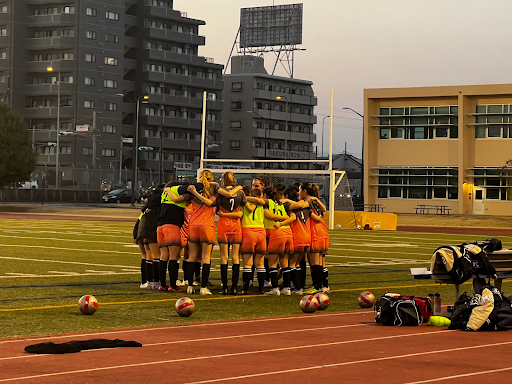In the ever-evolving landscape of US college admissions, the pursuit of a coveted acceptance letter is a game with unclear rules. Many selective universities saw record-low acceptance rates for the class of 2027, such as Vanderbilt’s 5.6%, NYU’s 8%, and Harvard’s 3.4%. As colleges become test-optional and the prevalence of grade inflation increases, elite universities have adopted a holistic process that includes one elusive element: authenticity.
But what exactly is authenticity, and is it the key to college admission?
Studies indicate that college applications are one of the main sources of stress for high school students. This pushes students to try to do what they can to increase their chances of admission to selective schools. Many students believe that doing as many extracurriculars as they possibly can is what colleges are looking for. On average, teens spend 7.9 hours in extracurricular activities per week. However, the International School of the Sacred Heart college counselor, Ms. Holly Sin, finds that the extracurricular activities themselves are not as important as the way the students reflect on them.
“It’s not about what they do, it’s how they write about it and reflect on what they learned. You can do a lot of different things, but what colleges want to know is how that experience made you a better person, a better learner,” Ms. Sin said. “They want to know how the activity reflects [the student’s] own values, and how those match what the schools are looking for.”
Ms. Sin advises against students following a “checklist” and finds that focusing on activities they enjoy is the best way to demonstrate genuine impact.
“When [students] follow a “checklist” for extracurriculars, you can tell that it’s hard for them to describe their impact and share what makes them do it. Sometimes students don’t see it because they’re in it. They feel like there’s a checklist, and if they follow that checklist, they’re doing something right. But I feel like that’s where it comes out, whether someone really, truly enjoys what they do or someone who’s doing it because everyone else is doing it.”
While college blogs advise students only to do what they enjoy, do admissions officers agree? Senior Counselor for International Admissions at the University of Rochester, Mr. Leif Johansen, acknowledged variation in admissions processes across institutions.
“I only work for one institution, and maybe there are some generalizations I can make that would apply to other institutions, but I can’t guarantee.”
Mr. Johansen then agreed that students should participate in activities that they’re passionate about; however, he asserted that extracurriculars are not as pivotal as many students may think.
“It’s true that a student who lists one thing on their activities list, which, I’ve seen before, is at a slight disadvantage compared to someone who’s doing eight things that it seems like they’re really engaged in.”
“We know that we’ve created a system where students would feel like the more stuff they do, the better chance they have of getting into a school,” acknowledged Mr. Johansen.
“We expect students to maybe exaggerate about their extracurriculars a bit because we know that there’s an incentive for students to do that. So, usually, we’re not making an admission decision based on whether they are the president of six things or five things at their school, ” Mr. Johansen maintained.
“It would be very difficult to tell for certain that the student is only doing these things to look good on their college application. But again, we’re just aware that there’s an incentive out there for students to try to pick up as many titles or join as many things as they can, knowing that they have ten spots to describe things on their activities list on their Common Application, and they want each of those ten things to be the most amazing things where they’re curing cancer before breakfast, and they’re rescuing baby animals by dinnertime!”

Many students stress over the extracurricular section of the application and devote many hours of their lives in high school to this. However, Mr. Johansen said that students should refrain from doing this.
“There’s all of those other data points and all those other factors that we’re thinking about as well. Please know that there is not that much riding on your extracurricular involvement. It’s not nothing on your application, but it’s not everything on your application,” said Mr. Johansen. “I would say follow your heart and do what you enjoy doing because otherwise, you’re just kind of wasting your time. I think being miserable like that just isn’t worth it.”
Ms. Sin shares the sentiment that students should spend their time on things they truly enjoy.
“Instead of investing time just to get a certain acceptance, it’s better to invest in yourself so that you can use it in the long run,” Ms. Sin advised. “Spend some more time on something that you enjoy. That comes out when you write about it, and you can really tell the difference.”
So, if extracurriculars aren’t the most crucial factor of college admissions, what should students focus on most?
Ms. Sin believed that students should focus on developing themselves as people and showing admissions officers who they are through their essays.
“I think they are looking for those factors because it humanizes the process when they’ve seen so many transcripts, so many test scores, so many recommendation letters. Having those essays can help them distinguish and understand what this student is about, and what are some of the priorities for this student,” she said. “Then they can see whether the student is a good fit for their campus. For the admissions people, they want to see someone who has the same values as the school.”
Mr. Johansen also agreed that essays are an important factor during the admissions process; however, he emphasized that, above all, grades are by far the most important factor.
“In terms of what we look for in a student, when I open a student’s application, my first question is: is this student going to be academically successful at our institution if they’re admitted? That is the initial question before we can get to the other parts of the application that are more nuanced. I would say if you’re trying to maximize your chances of getting in, remember that we’re still looking at your academics before we’re looking at anything else. So, don’t sacrifice those.”
When asked about his overall advice for the admissions process, Mr. Johansen suggests that students stay true to themselves.
“I think that in general in life, when, when you try to be someone who you are not genuinely, when you try to overplay your hand, inflate yourself, or underplay your hand and deflate yourself unnecessarily, or when you do stuff that you don’t love, but because you think it will be advantageous to you, I think that often times you end up getting burnt out. Because you can’t sustain that forever.”
Mr. Johansen also emphasized that students should not dedicate their whole lives to college applications.
“Don’t worry so much about what other people think and what other people are doing and whatever the flavor of the day is in terms of the most impressive activities or the most selective organizations to get into, because those things change all the time. Trends among young people in two years are going to be totally different from what they are right now. So, just enjoy being yourself.”
With the record low acceptance rates, college admissions seem to be an unwinnable game. So why bother trying to “play” with any sort of strategy? Authenticity is not something a student can cultivate for an application. It’s highly unlikely that being truly authentic or even presenting a facade of authenticity will help increase chances of acceptance. If students try to create an inauthentic version of themselves, they still may not get their desired acceptance, and in the process, they may end up losing themselves.







































